现在完成时和现在完成进行时
现在完成时与现在完成进行时

强调动作的进行状态
用来描述动作的进行过程
表示临时的行为或状况
用于描述暂时性的活动或情况
用于描述具有与现在的联系的事件或状态
表示已完成的行为
用来描述已经完成的动作或状态
现在完成时与过去时的区别
1
现在完成时
与现在有联系
过去时
2
过去的事情
3
现在完成时
对现在有影响
现在完成进行时的基本形式
1 肯定句
主语 + have/has + been + 现在分词
2 否定句
主语 + have/has + not + been + 现在分词
3 疑问句
Have/Has + 主语 + bee成进行时的构成
主语
可以是第一人称(I,we), 第二人称(you),第三人 称(he,she,it,they)
助动词
使用have/has
过去分词
表示进行中的动作
现在完成进行时的用法
表示动作的延续性
用于描述从过去一直延续到现在的进行中的动作
2 否定句
主语 + have/has + not + 过去分词
现在完成时的构成
主语
可以是第一人称(I,we), 第二人称(you),第三人 称(he,she,it,they)
助动词
使用have/has
过去分词
表示完成的动作或状态
现在完成时的用法
强调过去经验
用来描述过去发生的经历和经验
表示未完成的行为
现在完成时与现在完成进 行时
现在完成时是表示过去某个时间点开始,一直延续到现在,并可能继续下去 的动作或状态。现在完成进行时表示过去某个时间点开始一直延续到现在的 动作。
现在完成进行时和现在完成时有什么区别
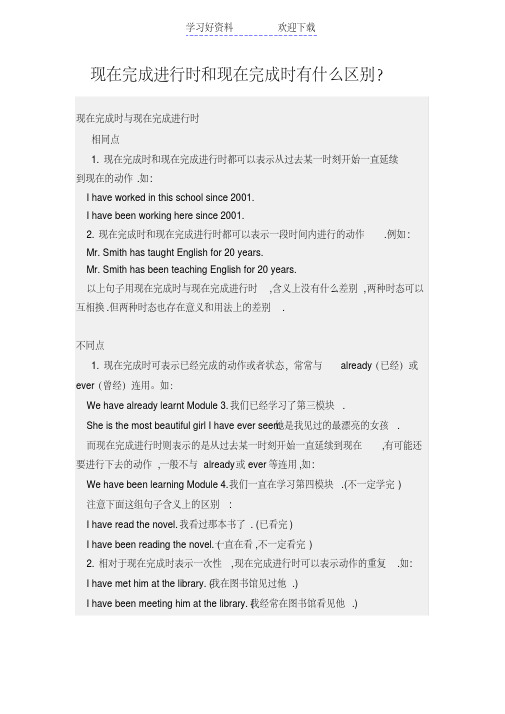
现在完成进行时和现在完成时有什么区别?现在完成时与现在完成进行时相同点1. 现在完成时和现在完成进行时都可以表示从过去某一时刻开始一直延续到现在的动作.如:I have worked in this school since 2001.I have been working here since 2001.2. 现在完成时和现在完成进行时都可以表示一段时间内进行的动作.例如:Mr. Smith has taught English for 20 years.Mr. Smith has been teaching English for 20 years.以上句子用现在完成时与现在完成进行时,含义上没有什么差别,两种时态可以互相换.但两种时态也存在意义和用法上的差别.不同点1. 现在完成时可表示已经完成的动作或者状态,常常与already(已经)或ever(曾经)连用。
如:We have already learnt Module 3. 我们已经学习了第三模块.She is the most beautiful girl I have ever seen.她是我见过的最漂亮的女孩.而现在完成进行时则表示的是从过去某一时刻开始一直延续到现在,有可能还要进行下去的动作,一般不与already或ever等连用,如:We have been learning Module 4. 我们一直在学习第四模块.(不一定学完)注意下面这组句子含义上的区别:I have read the novel. 我看过那本书了. (已看完)I have been reading the novel. (一直在看,不一定看完)2. 相对于现在完成时表示一次性,现在完成进行时可以表示动作的重复.如:I have met him at the library. (我在图书馆见过他.)I have been meeting him at the library. (我经常在图书馆看见他.)3. 现在完成时和现在完成进行时都可以表示刚刚结束的动作,但在含义上有区别.现在完成时强调的是动作的结果,而现在完成进行时强调的则是动作的过程.如:—You look so tired, what have you been doing 你看起来很累,做什么了(强调动作)—We are very tired. We've been cleaning the house. 我们很累,我们刚才在打扫房子.(强调该动作所导致)—We've cleaned the house. You may come in now. 我们打扫过房子了,你可以进来了.(强调结果"房子干净")4. 现在完成进行时态不能用来谈某个动作的具体次数或几件事情.这时,我们要用现在完成时态.如:)I have been drinking five cups of coffee this afternoon.(×I have drunk five cups of coffee this afternoon.5. 现在完成时强调"事实";而现在完成进行时则强调"动作",并且常含有喜悦,愤怒,不满,厌恶等感情色彩.如:The lazy boy has lain in bed for a whole day. 这个懒孩子在床上躺了一天.(强调事实)The lazy boy has been lying in bed for a whole day. 这个懒孩子在床上躺了一天了.(强调动作,含有对小男孩厌恶的感情色彩)6. 如果没有时间状语,现在完成进行时有延续性,现在完成时没有.如:I've been cleaning the house but I still haven't finished.)I've cleaned the house, but I still haven't finished.(×现在完成进行时:1.强调过程,一直在做,带有情绪,对现在有一定有影响,动作重复。
语法中的现在完成时与现在完成进行时
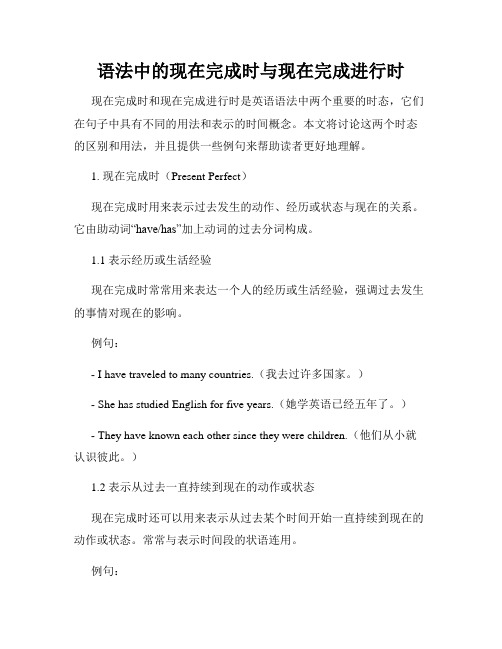
语法中的现在完成时与现在完成进行时现在完成时和现在完成进行时是英语语法中两个重要的时态,它们在句子中具有不同的用法和表示的时间概念。
本文将讨论这两个时态的区别和用法,并且提供一些例句来帮助读者更好地理解。
1. 现在完成时(Present Perfect)现在完成时用来表示过去发生的动作、经历或状态与现在的关系。
它由助动词“have/has”加上动词的过去分词构成。
1.1 表示经历或生活经验现在完成时常常用来表达一个人的经历或生活经验,强调过去发生的事情对现在的影响。
例句:- I have traveled to many countries.(我去过许多国家。
)- She has studied English for five years.(她学英语已经五年了。
)- They have known each other since they were children.(他们从小就认识彼此。
)1.2 表示从过去一直持续到现在的动作或状态现在完成时还可以用来表示从过去某个时间开始一直持续到现在的动作或状态。
常常与表示时间段的状语连用。
例句:- He has worked in this company for ten years.(他在这家公司工作了十年。
)- We have lived in this city since 2010.(我们从2010年开始就一直住在这个城市。
)1.3 表示刚刚完成的动作现在完成时还可以用来表示刚刚发生或完成的动作,并且与现在的情况或结果有关。
例句:- I have just finished my homework.(我刚刚完成了作业。
)- She has already left for the airport.(她已经去机场了。
)2. 现在完成进行时(Present Perfect Continuous)现在完成进行时用来表示从过去开始一直持续到现在的动作,并强调动作的持续性。
现在完成时和现在完成进行时的区别

现在完成时和现在完成进行时的区别现在完成时和现在完成进行时是英语中两个常见的时态,它们在用法和意义上有一些区别。
现在完成时现在完成时是表示过去发生的动作对当前情况造成的影响或结果,常用以下结构:主语 + have/has + 过去分词现在完成时的用法如下:1. 表示过去的动作或事件对当前时间产生的影响:- I have finished my homework. (我已经完成了作业)- She has lost her keys. (她丢了钥匙)- They have lived in this city for five years. (他们在这个城市居住了五年)2. 表示过去某个时间点之前已经完成的动作:- They have already left. (他们已经离开了)- She has never been to Europe. (她从未去过欧洲)- Have you seen that movie? (你看过那部电影吗?)3. 表示经验、知识或技能的积累:- I have studied English for years. (我学英语已经好几年了)- He has played the piano since he was a child. (他从小就学钢琴)现在完成进行时现在完成进行时是表示从过去某一时间开始一直延续到当前的动作,常用以下结构:主语 + have/has been + 动词的现在分词现在完成进行时的用法如下:1. 表示从过去某一时间开始一直持续到当前的动作:- He has been working on this project all day. (他一整天都在做这个项目)- They have been studying for the exam for weeks. (他们几周都在准备考试)2. 表示反复出现的动作或情况:- It has been raining a lot recently. (最近一直在下雨)- The baby has been crying all night. (宝宝整晚都在哭)3. 表示对过去动作的强调或感叹:- I can't believe you have been waiting for me since morning. (我不敢相信你等了我一整个早上)- Wow, you have been cleaning the house all day! (哇,你一整天都在打扫房子!)总结现在完成时和现在完成进行时的区别主要在于时间表达和动作的性质。
现在完成时和现在完成进行时

现在完成时和现在完成进行时现在完成进行时(一)定义:1.表示从过去某时开始一直持续到现在的动作,并且还将持续下去。
2.表示在说话时刻之前到现在正在进行的动作。
(二)基本结构:I / we / they have been + 动词的现在分词He / she / it has been + 动词的现在分词(三)用法:1、表示从过去某时开始一直持续到现在的动作,并且还将持续下去。
The Chinese have been making paper for two thousand years.中国有2000年的造纸历史。
(动作还将继续下去)I have been learning English since three years ago.自从三年前以来我一直在学英语。
(动作还将继续下去)I study for Engilsh since 10 years ago.2、表示在说话时刻之前到现在正在进行的动作。
We have been waiting for you for half an hour.我们已经等你半个钟头了(人还没到,如同在电话里说的,还会继续等)3、有些现在完成进行时的句子等同于现在完成时的句子。
They have been living in this city for ten years.They have lived in this city for ten years.他们在这个城市已经住了10年了。
I have been working here for five years.I have worked here for five years.我在这里已经工作五年了。
4、大多数现在完成进行时的句子不等同于现在完成时的句子。
I have been writing a book.(动作还将继续下去)我一直在写一本书。
I have written a book.(动作已经完成)我已经写了一本书。
现在完成时和完成进行时区别

Thank you!
现在完成时和现在完成进行时的主要区别
现在完成进行时着重表示动作的延续性,而 现在完成时着重表示动作的结果。
She has read this book. She has been reading this book.
I have worked here for three years. I have been working here for 3 years.
现在完成时和现在完成进行时的区别 II (3)有些表示状态、感情、感觉的静态动词, 如:have, like, hate, hear, know, sound等动词 不能用于现在完成进行时,但可用于现在完成 时。如: They’ve known each other since 1970. 自从1970年起他们就相互认识了。 (4)现在完ቤተ መጻሕፍቲ ባይዱ进行时也可表示现在以前这段时 间反复发生的事情。如: We’ve been seeing each other quite a lot recently. 最近我们经常见面。
现在完成时和现在完成进行时的区别 II
(1)在不用时间状语的情况下,现在完成进行时表示 动作仍在进行。而现在完成时则表示动作在过去已结 束。如: The students have been preparing for the exam. (还在进行)学生们一直在准备考试。 The students have prepared for the exam. (已经结束)学生们为考试作了准备。 (2)在强调指出动作还未结束,还要继续下去。如: I’ve been reading this book for two hours, but I haven’t finished it. 这本书我已读了两个小时了,但我还没读完。 I’ve read this book. 我已读完这本书了。
现在完成时和现在完成进行时
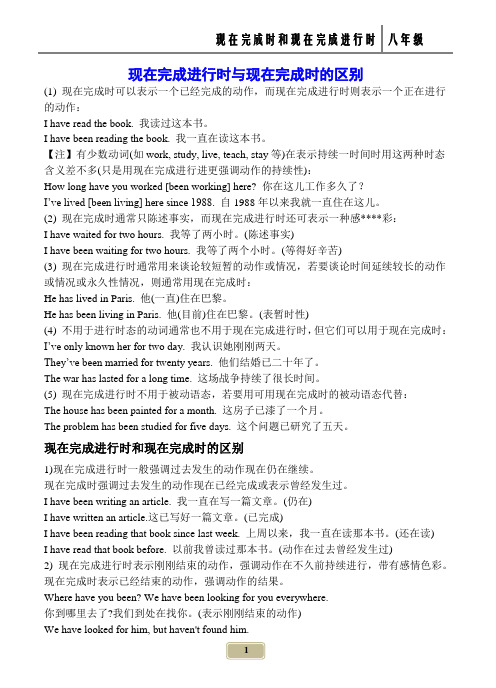
现在完成进行时与现在完成时的区别(1) 现在完成时可以表示一个已经完成的动作,而现在完成进行时则表示一个正在进行的动作:I have read the book. 我读过这本书。
I have been reading the book. 我一直在读这本书。
【注】有少数动词(如work, study, live, teach, stay等)在表示持续一时间时用这两种时态含义差不多(只是用现在完成进行进更强调动作的持续性):How long have you worked [been working] here? 你在这儿工作多久了?I‟ve lived [been living] here since 1988. 自1988年以来我就一直住在这儿。
(2) 现在完成时通常只陈述事实,而现在完成进行时还可表示一种感****彩:I have waited for two hours. 我等了两小时。
(陈述事实)I have been waiting for two hours. 我等了两个小时。
(等得好辛苦)(3) 现在完成进行时通常用来谈论较短暂的动作或情况,若要谈论时间延续较长的动作或情况或永久性情况,则通常用现在完成时:He has lived in Paris. 他(一直)住在巴黎。
He has been living in Paris. 他(目前)住在巴黎。
(表暂时性)(4) 不用于进行时态的动词通常也不用于现在完成进行时,但它们可以用于现在完成时:I‟ve only known her for two day. 我认识她刚刚两天。
They‟ve been married for tw enty years. 他们结婚已二十年了。
The war has lasted for a long time. 这场战争持续了很长时间。
(5) 现在完成进行时不用于被动语态,若要用可用现在完成时的被动语态代替:The house has been painted for a month. 这房子已漆了一个月。
现在完成时和现在完成进行时
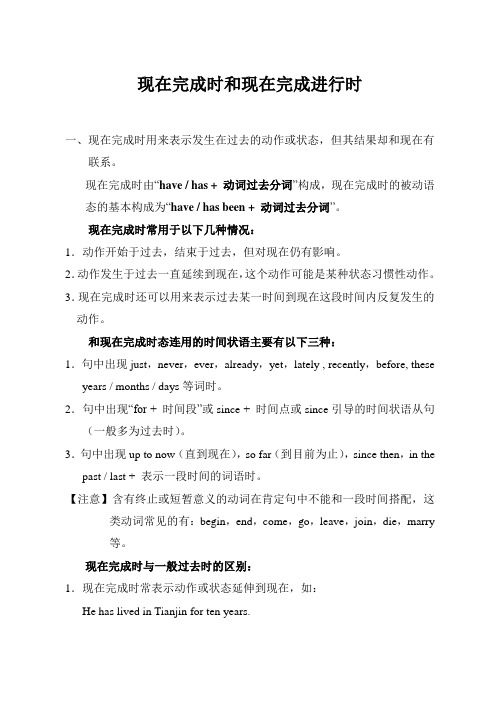
现在完成时和现在完成进行时一、现在完成时用来表示发生在过去的动作或状态,但其结果却和现在有联系。
现在完成时由“have / has + 动词过去分词”构成,现在完成时的被动语态的基本构成为“have / has been + 动词过去分词”。
现在完成时常用于以下几种情况:1.动作开始于过去,结束于过去,但对现在仍有影响。
2.动作发生于过去一直延续到现在,这个动作可能是某种状态习惯性动作。
3.现在完成时还可以用来表示过去某一时间到现在这段时间内反复发生的动作。
和现在完成时态连用的时间状语主要有以下三种:1.句中出现just,never,ever,already,yet,lately , recently,before, these years / months / days等词时。
2.句中出现“for + 时间段”或since + 时间点或since引导的时间状语从句(一般多为过去时)。
3.句中出现up to now(直到现在),so far(到目前为止),since then,in the past / last + 表示一段时间的词语时。
【注意】含有终止或短暂意义的动词在肯定句中不能和一段时间搭配,这类动词常见的有:begin,end,come,go,leave,join,die,marry等。
现在完成时与一般过去时的区别:1.现在完成时常表示动作或状态延伸到现在,如:He has lived in Tianjin for ten years.一般过去时虽也可指延伸,但它不能延伸到现在。
He lived in Tianjin for ten years.2.一般过去时只表示某个动作或状态曾经发生过,与现在并无联系,而现在完成时则表示过去的动作或状态对现在有影响。
We’d better stop her from doing such hard work, for she has been seriously ill.(过去的动作对现在造成了影响)He was ill last week.(并没有涉及现在的情况)3.现在完成时的时间状语可以同不确定的过去时间状语连用(如already,just,before,recently等),还可以同包括现在时间在内的时间状语连用(如today,this morning,this month,this year等),还可以和时间段连用。
现在完成时和现在完成进行时
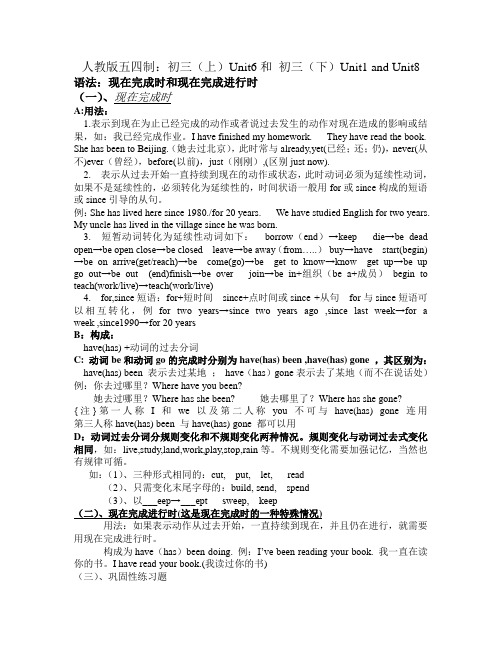
人教版五四制:初三(上)Unit6和初三(下)Unit1 and Unit8 语法:现在完成时和现在完成进行时(一)、现在完成时A:用法:1.表示到现在为止已经完成的动作或者说过去发生的动作对现在造成的影响或结果,如:我已经完成作业。
I have finished my homework. They have read the book. She has been to Beijing.(她去过北京),此时常与already,yet(已经;还;仍),never(从不)ever(曾经),before(以前),just(刚刚),(区别just now).2. 表示从过去开始一直持续到现在的动作或状态,此时动词必须为延续性动词,如果不是延续性的,必须转化为延续性的,时间状语一般用for或since构成的短语或since引导的从句。
例:She has lived here since 1980./for 20 years. We have studied English for two years. My uncle has lived in the village since he was born.3. 短暂动词转化为延续性动词如下:borrow(end)→keep die→be dead open→be open close→be closed leave→be away(from…..)buy→h ave start(begin) →be on arrive(get/reach)→be come(go)→be get to know→know get up→be up go out→be out (end)finish→be over join→be in+组织(be a+成员)begin to teach(work/live)→teach(work/live)4. for,since短语:for+短时间since+点时间或since +从句for与since短语可以相互转化,例for two years→since two years ago ,since last week→for a week ,since1990→for 20 yearsB:构成:have(has) +动词的过去分词C: 动词be和动词go的完成时分别为have(has) been ,have(has) gone ,其区别为:have(has) been 表示去过某地;have(has)gone表示去了某地(而不在说话处)例:你去过哪里?Where have you been?她去过哪里?Where has she been? 她去哪里了?Where has she gone? {注}第一人称I和we以及第二人称you 不可与have(has) gone 连用第三人称have(has) been 与have(has) gone 都可以用D:动词过去分词分规则变化和不规则变化两种情况。
现在完成时与现在完成进行时

现在完成时与现在完成进行时的区别
1)现在完成时强调动作行为的结果、影响,而现在完 成进行时强调动作行为本身。
Tom’s hands are very dirty. He has been repairing the car. The car is going again now. Tom has repaired it. 2)不用时间状语的情况下,现在完成进行时表示动作 仍在进行,而现在完成时则表示动作已经结束。
现在完成时和现在完成进 行时
现在完成时
1. 基本结构:
肯定句:主语+have/has+done+其他
否定句: 主语+has not/ have not+done+其他 疑问句: Have/Has +主语+done+其他?
2. 常搭配的时间状语:
already, recently, lately, yet, just, ever, never, before(单独使用), so far, up to now, till now, over+ 段时间, in the last/past few years, for +段时间, since+ 过去时间点或从句。
用于现在完成时的常用句型: It/This/That is the first/second time that … It is the first time that I have come to Zhuhai. It/This/That is the only…+that从句” 或“It/This/That is the +形容词最高级/序数词… + that从句
10 . Hurry up! The play ____ for ten minutes. A. has begun B. had begun C. has been on D. began 11. Excuse me, Marcia, a reporter from Vanity Fair ____ all day. Could you speak to her now?. A. phones B. has phoned C. has been phoning D. phoned 12.---That must have been a long trip. ---Yeah, it ___us a whole week to get there. A. takes B. has taken C. took D. was taking 13. ---Bob has gone to California. ---Oh, can you tell me when he ____? A. has left B. left C. is leaving D. would leave 14. She set out soon after dark_____ home an hour later. A. arriving B. to arrive C. having arrived D. and arrived
现在完成时和现在完成进行时有什么区别

现在完成时和现在完成进行时有什么区别现在完成时(Present perfect)过去发生并且已经完成的动作对现在造成影响或后果,过去某一时间开始并一直持续到现在的动作或状态。
(1)强调动作是过去发生的(2)强调对现在的影响或结果(3)在过去不确定的时间里发生的动作,但是结果对现在有影响。
现在完成进行时其表达的意思有两种:1.表示从过去某时开始一直持续到现在的动作,并且还将持续下去。
2.表示在说话时刻之前到现在正在进行的动作。
现在完成进行时其构成形式如下: I / we / they have been + 动词的现在分词He / she / it has been + 动词的现在分词功用如下: 1)表示一个在过去开始而在最近刚刚结束的行动,如:Ann is very tired. She has been working hard.Why are you clothes so dirty? What have you been doing?2) 表示一个从过去开始但仍在进行的行动,如:It has been raining for two hours. (现在还在下)Jack hasn’t been feeling very well recently.3) 表示一个从过去开始延续到现在,可以包括现在在内的一个阶段内,重复发生的行动,如:She has been playing tennis since she was eight.4) 现在完成时强调动作行为的结果、影响,而现在完成进行时只强调动作行为本身,如: Tom’s hands are very dirty. He has been repairing the car. The car is going again now. Tom has repaired it.注意:现在完成时有否定结构、而现在完成进行时没有否定结构。
现在完成时态可表示做完的时期以及已有的经验、但现在完成进行时不可以A) 表示动作到现在为止已经完成或刚刚完成。
现在完成时与现在完成进行时的区别

1 错误
2 纠正
使用现在完成时和现在完成进行时来表示将来。
使用未来时态来表示将来的动作。
3 错误
误用过去分词和现在分词。
4 纠正
明确使用过去分词和现在分词来区分不同的时态。
现在完成时和现在完成进行时的例句分析
现在完成时
我已经完成了这个项目。 她已经去过巴黎三次了。
现在完成进行时
我一直在学习英语。 他们一直在等你的电话。
现在完成时和现在完成进行时的时间范围
1
现在完成时过去Leabharlann 个时间点到现在现在完成进行时
2
过去某个时间点一直到现在
3
举例
现在完成时:我已经吃饭了。 现在完成进 行时:我一直在吃饭。
现在完成时和现在完成进行时的语态和疑问形 式
现在完成时和现在完成进行时的语态和疑问形式与一般现在时相同。
现在完成时和现在完成进行时的常见错误及纠 正方法
现在完成时与现在完成进 行时的区别
现在完成时是表示过去发生的动作对现在造成的影响或结果,而现在完成进 行时是表示过去开始并一直延续到现在的动作或状态。
现在完成时与现在完成进行时的含义
现在完成时表示过去已经发生的动作对现在造成的影响或结果,强调过去发生的事情与现在的联系。现在完成进行 时表示过去开始并一直延续到现在的动作或状态,强调动作的持续性。
现在完成时和现在完成进行时的构成方法
现在完成时
助动词"已经" + 过去分词
现在完成进行时
助动词"一直在" + be动词的进行时 + 现在分词
现在完成时和现在完成进行时的使用 范围
1 现在完成时
用于表示过去发生的动作与现在的关系,常用于经验、经历、成就、状况、完成等。
现在完成时与现在完成进行时

现在完成时与现在完成进行时现在完成时和现在完成进行时现在完成时(Present Perfect Tense)和现在完成进行时(Present Perfect Progressive Tense)是英语中两种重要的时态形式。
本文将对这两种时态进行解释和比较,并提供一些例句来帮助读者更好地理解和应用。
一、现在完成时(Present Perfect Tense)1.定义和结构现在完成时用来表示过去发生的动作或事件对现在造成的影响或结果。
它的结构由助动词“have/has”和过去分词形式的动词构成。
2.用法(1)表示过去发生的动作或事件对现在造成的影响或结果。
例如:- I have finished my homework.(我已经完成了我的作业。
)- They have moved to a new city.(他们已经搬到了新城市。
)(2)表示过去发生的动作或事件在现在仍然持续或存在。
例如:- I have lived in this city for five years.(我在这个城市已经住了五年了。
)- She has known him since childhood.(她从小就认识他。
)(3)表示过去曾经发生过的但时间不明确的动作或事件。
例如:- Have you ever been to Paris?(你曾经去过巴黎吗?)- He has read a lot of books.(他读过很多书。
)3.例句(1)肯定句:- I have seen that movie before.- We have visited the museum many times.- They have already finished their dinner.(2)否定句:- She hasn't finished her work yet.- He hasn't traveled abroad.- They haven't bought a new car.(3)疑问句:- Have you ever been to Japan?- Has she finished her presentation?- Have they seen this movie?二、现在完成进行时(Present Perfect Progressive Tense)1.定义和结构现在完成进行时用来表示发生在过去某段时间内一直持续的动作或事件。
现在完成时与现在完成进行时的区别

They have been playing tennis since two o’clock. They’ve played tennis three times this week.
5.You have never driven a car before ?
Sorry! This is the first time I’ve driven a car.
现在完成时用法三: 表示到目前为止的时间段内重复发生的动作。
Some villagers say that they have seen UFOs many times.
They have visited us a number of times in the past two years.
现在完成时用法四: 现在完成时用于下列固定句式中:
1. It is the first/ last/ second …time that …have / has done.
2. It is the best/ worst/ most(形容词的最高级) + n + that …have / has (ever)done.
1.I’ve been reading some poems by Libai. (unfinished) I’ve read five poems. (finished)
2.They have discussed the problem at the meeting. (finished)
现在完成时和现在完成进行 时的区别

现在完成进行时与现在完成时的区别(1) 现在完成时可以表示一个已经完成的动作,而现在完成进行时则表示一个正在进行的动作:I have read the book. 我读过这本书。
I have been reading the book. 我一直在读这本书。
【注】有少数动词(如work, study, live, teach, stay等)在表示持续一时间时用这两种时态含义差不多(只是用现在完成进行进更强调动作的持续性):How long have you worked [been working] here? 你在这儿工作多久了?I’ve lived [been living] here since 1988. 自1988年以来我就一直住在这儿。
(2) 现在完成时通常只陈述事实,而现在完成进行时还可表示一种感情色彩:I have waited for two hours. 我等了两小时。
(陈述事实)I have been waiting for two hours. 我等了两个小时。
(等得好辛苦)(3) 现在完成进行时通常用来谈论较短暂的动作或情况,若要谈论时间延续较长的动作或情况或永久性情况,则通常用现在完成时:He has lived in Paris. 他(一直)住在巴黎。
He has been living in Paris. 他(目前)住在巴黎。
(表暂时性)(4) 不用于进行时态的动词通常也不用于现在完成进行时,但它们可以用于现在完成时:I’ve only known her for two day. 我认识她刚刚两天。
They’ve been married for twenty years. 他们结婚已二十年了。
The war has lasted for a long time. 这场战争持续了很长时间。
(5) 现在完成进行时不用于被动语态,若要用可用现在完成时的被动语态代替:The house has been painted for a month. 这房子已漆了一个月。
现在完成时及现在完成进行时

现在完成时和现在完成进行时一.现在完成时的构成:现在完成时由助动词have(has)+动词的过去分词构成。
has用于第三人称单数,have用于其他各种人称.二.现在完成时的用法:其用法主要有三种I.“已完成”用法 :表示一个过去发生并结束的动作对现在造成的影响或结果。
这一类情况可以细致分为下述两种情况。
1)表示开始于过去的动作刚刚结束。
常和just,now,already,yet,not…yet等不确定的时间状语连用。
Li Ming has just turned off the light. 李明刚刚把灯关上。
(说明现在灯关上了)I've finished my homework now. 现在我已经做完作业了。
(说明可以交作业或做别的了)2)表示过去动作的结果,现在仍残留着。
一般不用时间状语。
I have lost my pen. 我把笔丢了。
(说明过去某时丢的,现在我还没找到这支笔)She has become a teacher. 她已经当了老师。
(说明她现在仍是老师)II.“未完成”用法。
表示动作或状态从过去某时开始,持续到现在,可能继续下去,也可能刚刚结束。
常和表示一段时间的状语连用。
如today,this week(month),lately,recently,these days,in the past few days,during the last two weeks,since,since yesterday,since 2 days ago,since 1991,for a long time,for a month,so far,up to now,till(until)now等。
He has lived here for 30 years. 他住在这儿三十年了。
(现在还住在这儿)They've known each other since childhood. 他们从小彼此相识。
现在完成时态和现在完成进行时态

现在完成时态与现在完成进行时现在完成时态和现在完成进行时态在时间意义和用法上有不易区别之处。
现对这两种时态进行对比和分析,重点是比较两者在相同或类似的句子中的区别,以及两者在同一交际场景下的不同意义。
一、现在完成时表示的意义1. 时间未指明或不确定的过去动作。
例如:I have interviewed eight interviewees,much quicker than scheduled.我已经面试了八个人,比原计划快多了。
如果仅说明“时间未指明、不确定的过去动作”所带来的结果仍不能满足交际的需要,则需要现在完成时态与一般过去时态一起使用,对当时动作的执行情况加以描述。
例如:-Have you consulted the directors about the present situation of electricity shortage?你和主任们讨论过近来电力短缺的问题了吗?-Yes,(I have.)Director Zhang and I talked over this last Saturday.是啊,上周六我和王主任讨论了。
2. 表示过去发生的动作,这个动作有可能现在还在重复。
例如:The famous scriptwriter has written strongly about life improvements to the lives of citizens. 这位著名剧作家一直以来为改善市民生活的问题执笔呐喊。
这句话的意思是“你可以看到这位剧作家现在还这么做”。
如果这位剧作家已经不这样做了,或者该人已经去世了,即该动作不存在重复性了,则应作如下表达:The famous scriptwriter wrote strongly about improvements to the lives of citizens.这位著名剧作家曾为改善市民生活的问题执笔呐喊。
3.表示近期不确定时间内的一次或重复性的动作或状态。
现在完成时和现在完成进行时的区别

现在完成时和现在完成进行时的区别It has been raining since last Friday.Jim has been ringing John every night for the last week.三、区别1.现在完成时表示动作已经完成,现在完成进行时用来谈论未完成的动作。
I have painted this room.(I’ve finished painting it.)I have been painting this room.(I haven’t finished painting it.)2.注意现在完成时动作的结果,尤其是涉及数字或数量的时候;现在完成进行时注重动作本身,尤其是在解释动作的可见结果时。
He’s run three miles. (the result: He’s covered the distance of three miles.)He’s been running for an hour. (the activity and its consequences: this is what he’s been doing for the last hour and why he is exhausted now.)3.现在完成进行时表示重复动作时,不能与表示具体数字的词连用。
I’ve posted a dozen postcards, but received none.I’ve read this book several times.I’ve been posting postcards since early December.4.现在完成进行时带有强烈的感情色彩。
You have been disturbing me.5.许多状态动词不能用于完成进行时。
I’ve known that for a long time.The strike has lasted six months.6.少数动词两种时态都可以用,但强调时间长短时最好用完成进行时。
- 1、下载文档前请自行甄别文档内容的完整性,平台不提供额外的编辑、内容补充、找答案等附加服务。
- 2、"仅部分预览"的文档,不可在线预览部分如存在完整性等问题,可反馈申请退款(可完整预览的文档不适用该条件!)。
- 3、如文档侵犯您的权益,请联系客服反馈,我们会尽快为您处理(人工客服工作时间:9:00-18:30)。
现在完成时和现在完成进行时小练习1. He _____ with his first teacher for quite a long time.A. lost touchB. got in touchC. lost in touchD. has been out of touch2. Mary _____ Green for five years.A. has marriedB. has married withC. marriedD. has been married to3. It's the third time I ______him this month.A. had seenB. have seenC. sawD. see4. Tom ________for more than a week.A. has been awayB. has gone awayC. went awayD. has left5. We _____each other since I left Shanghai.A. haven't seenB. hadn't seenC. didn't seeD. wouldn't see6. He ________with us since he returned last month.A. livesB. livedC. had livedD. has lived7. They _____here for more than a month.A. have arrivedB. have reachedC. have comeD. have been8. Comrade Wang ____the Party for about three years.A. has attendedB. has joinedC. has been inD. has taken part in9. The book _____on the floor for ten minutes, but no one has picked it up.A. is lyingB. has lainC. has been lyingD. lay10. I _______from him so far.A. didn’t hearB. don't hearC. haven't heardD. hadn't heard11. Great changes ________in my hometown in the past few years.A. were taken placeB. have been taken placeC. took placeD. have taken place12. ________ the new color film ________this year?A. Has; been shownB. Did; showC. Are; shownD. Will; show13. ---Why does Mary look to be so sorry? ---Because she _________by her classmates.A. has been laughedB. has laughed atC. was laughedD. has been laughed at14. For this he _________on twice.A. has operatedB. has been operatedC. had been operatedD. operated15. I haven’t seen you for quite some time. What ______lately?A. were you doingB. did you doC. have you been doingD. had you done16. The house looks much bigger now that we _______ the walls in brighter colours.A. are paintingB. have paintedC. had paintedD. have been painting17. ---How about my food? I _______ here for almost half an hour.---I’m sorry, sir. It must be ready by now.A. have been sittingB. am sittingC. had been sittingD. was sitting18. Mary ___________ at this school for thirty years but she hasn’t decided to retire.A. has been taughtB. has been teachingC. taughtD. had taught19. I ______ always ______ of him, but I can’t see him.A. had; been thinkingB. have; been thinkingC. was; thinkingD. have; thought20. Although medical science ______ control over several dangerous diseases,what worries us is that some of them are returning.A. achievedB. has achievedC. will achieveD. is achieving21. —Is it hard to drive downtown to work?—Yes, that’s why I to work by train.A. have been goingB. have goneC. was goingD. will have gone22. Every possible means _____, but none proves successful.A. has triedB. have been triedC. is being triedD. has been tried23. —It is said that another new car factory _____.—Yeah. It _____ for nearly two months already.A. is building; has been builtB. is built; has builtC. is being built; has been builtD. is being built; has been being built24. —Will you go to the park now?—Not until I ____ my physics exercises.A. will finishB. have finishedC. will have finishedD. had finished25. —Alice’s second-hand computer ____ wrong although she used it only once.—You’d better go to check it.A. wentB. is goingC. has goneD. had gone26. I can no longer put up with his way; he _____ always _____ me as a child.A. does; treatB. 不填; treatsC. has; treatedD. has; been treating27. —He ____ to the party.—What ____ to him? He said he would be here by eight o’clock.A. hasn’t come; happenedB. didn’t come; has happenedC. isn’t coming; had occurredD. hasn’t come; has happened28. —What bad luck that we ____ the football match in the last 3 minutes.—And we ____ hard in the last 3 years!A. had lost; trainedB. were losing; had trainedC. have lost; have trainedD. lost; have been training29. Hand in your papers when you ____ the test.A. are finishingB. will finishC. will have finishedD. have finished30. It __ for three hours and the ground is too damp to play on, so the sports meeting __.A. was raining; has been put offB. has been raining; has been put offC. has rained, is put offD. has been raining; has put off31. —Did you find the missing couple in the mountain yesterday?—No, but we ____ to get in touch with them ever since.A. have triedB. have been tryingC. had triedD. had been trying32. Years ago we didn’t know this, but recent science ____ that people who don’t sleepwell soon get ill.A. showedB. has shownC. will showD. is showing33. Now that she is out of a job, Lucy __ going back to school, but she hasn’t decided yet.A. had consideredB. has been consideringC. consideredD. is going to consider34. The country life he was used to ____ greatly since 1992.A. changeB. has changedC. changingD. have changed35. She has set a new record, that is, the sales of her latest book _____ 50 million.A. have reachedB. has reachedC. are reachingD. had reached。
